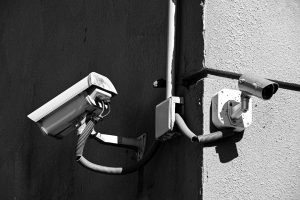Are Home Security Systems Worth It? Understanding Security System Benefits
In an era where safety concerns are on the rise,

Security is a top priority for both homes and businesses. Traditional security services and security systems are two common options that people consider when looking to protect their properties. Traditional security services typically involve hiring security guards or patrol officers to physically monitor and protect a property. On the other hand, security systems consist of a combination of cameras, alarms, and sensors that are installed to detect and deter potential threats. Both options have their own advantages and disadvantages, and it is important to understand them in order to make an informed decision.
One of the main advantages of traditional security services is the human interaction that comes with it. Having a physical presence on-site can provide a sense of security and peace of mind for both homeowners and business owners. Security guards can respond immediately to any suspicious activity or emergency situations, which can help prevent crimes from occurring or minimize their impact. Additionally, security guards can also provide customer service by assisting visitors or employees with any questions or concerns they may have.
However, there are also some disadvantages to traditional security services. One major drawback is the high cost associated with hiring security guards. The cost of employing security personnel can be quite expensive, especially for small businesses or homeowners on a tight budget. Additionally, traditional security services may have limited coverage, as security guards cannot be present in multiple locations at once. This means that there may be gaps in security coverage, leaving certain areas vulnerable to potential threats.
Security systems offer several advantages over traditional security services. One of the main benefits is 24/7 monitoring. With security systems, cameras and sensors are constantly monitoring the property, even when no one is physically present. This means that any suspicious activity can be detected immediately, and appropriate action can be taken. Additionally, many security systems offer remote access, allowing homeowners or business owners to monitor their property from anywhere at any time. This can provide a great deal of convenience and peace of mind.
However, security systems also have their disadvantages. One common issue is false alarms. Sometimes, security systems can be triggered by false positives, such as a pet or a tree branch moving in the wind. This can lead to unnecessary panic or inconvenience for the property owner. Another concern is the vulnerability of security systems to hacking. As technology advances, so do the methods used by hackers to gain unauthorized access to security systems. This can potentially compromise the security of the property and the privacy of the individuals involved.
When it comes to cost, traditional security services and security systems can vary significantly. Traditional security services typically involve ongoing expenses, such as salaries for security guards and maintenance costs for equipment. The cost of hiring security guards can range from a few hundred dollars to several thousand dollars per month, depending on factors such as the number of guards needed and the level of expertise required.
On the other hand, security systems usually involve an upfront cost for installation and equipment, followed by ongoing monitoring fees. The cost of installing a security system can vary depending on factors such as the size of the property and the complexity of the system. Additionally, there may be additional costs for maintenance and upgrades over time. However, once the initial investment is made, the ongoing monitoring fees are typically lower than the cost of hiring security guards.
Technology plays a crucial role in modern security systems. Cameras, alarms, and sensors are all examples of technology used in these systems. Cameras can capture high-quality video footage that can be used as evidence in case of a crime or incident. Alarms can alert both property owners and authorities to potential threats or emergencies. Sensors can detect motion or changes in temperature, allowing for immediate response to any suspicious activity.
Technology also enhances the effectiveness of security systems in several ways. For example, many security systems now offer remote access, allowing property owners to monitor their property from anywhere using their smartphones or computers. This provides convenience and peace of mind, as property owners can check in on their property at any time. Additionally, advancements in artificial intelligence and machine learning have made it possible for security systems to analyze data and detect patterns, making them more efficient at identifying potential threats.
Human interaction is a key aspect of traditional security services. Having a physical presence on-site can act as a deterrent to potential criminals. The presence of security guards can make individuals think twice before attempting to commit a crime, as they know that there is a higher chance of getting caught. Additionally, security guards can provide immediate response in case of an emergency or suspicious activity. They can assess the situation and take appropriate action, such as contacting the authorities or providing assistance to those in need.
Furthermore, human interaction can provide a sense of comfort and peace of mind for both homeowners and business owners. Knowing that there is someone physically present to monitor and protect the property can alleviate anxiety and fear. Security guards can also provide customer service by assisting visitors or employees with any questions or concerns they may have. This personal touch can enhance the overall experience and create a positive impression of the property.
Security systems have proven to be effective in preventing crime. Numerous studies have shown that the presence of security systems can act as a deterrent to potential criminals. The sight of cameras or alarms can make individuals think twice before attempting to commit a crime, as they know that their actions are being recorded or that an alarm will sound if they proceed. This can significantly reduce the likelihood of crimes such as burglary or vandalism.
Additionally, security systems can provide valuable evidence in case of a crime or incident. High-quality video footage captured by security cameras can be used to identify suspects or provide details about the events leading up to the incident. This evidence can be crucial in investigations and can help law enforcement agencies apprehend criminals and bring them to justice. Furthermore, security systems can also provide peace of mind for property owners, as they know that their property is being monitored and protected at all times.
One of the key benefits of security systems is 24/7 monitoring. With security systems, cameras and sensors are constantly monitoring the property, even when no one is physically present. This means that any suspicious activity can be detected immediately, and appropriate action can be taken. For example, if a security camera detects motion in a restricted area, an alert can be sent to the property owner’s smartphone or computer, allowing them to take immediate action.
24/7 monitoring provides constant protection for homes and businesses. It ensures that any potential threats or emergencies are detected and addressed promptly. This can help prevent crimes from occurring or minimize their impact. Additionally, 24/7 monitoring can also provide peace of mind for property owners, as they know that their property is being watched over at all times, even when they are not physically present.
One of the advantages of security systems is their flexibility and customization options. Security systems can be tailored to fit the specific needs of different homes and businesses. For example, a small apartment may only require a few cameras and sensors to provide adequate protection, while a large office building may need a more complex system with multiple cameras, alarms, and access control systems.
Furthermore, security systems can be customized to provide specific types of protection. For example, some systems offer fire detection and prevention features, such as smoke detectors and sprinkler systems. Others may offer access control systems, allowing property owners to restrict access to certain areas or grant access to authorized individuals. This flexibility allows property owners to choose the features and components that are most relevant to their specific needs and concerns.
When it comes to choosing between traditional security services and security systems, there are several factors to consider. First and foremost, it is important to assess your specific needs and concerns. Consider the size of your property, the level of security required, and any specific threats or risks that may be present. This will help you determine which option is best suited to address your unique situation.
Budget is another important factor to consider. Traditional security services can be quite expensive, especially for small businesses or homeowners on a tight budget. On the other hand, security systems typically involve an upfront cost for installation and equipment, followed by ongoing monitoring fees. Consider your budget and determine which option provides the best value for your money.
In conclusion, both traditional security services and security systems have their own advantages and disadvantages. Traditional security services offer human interaction and immediate response, but they can be costly and have limited coverage. On the other hand, security systems offer 24/7 monitoring and remote access, but they can be vulnerable to false alarms and hacking.
Ultimately, the decision between traditional security services and security systems depends on individual needs and preferences. It is important to assess your specific needs, budget, and concerns in order to make an informed decision. Regardless of the option chosen, it is crucial to prioritize security in order to protect your home or business from potential threats.
If you’re debating between traditional security services and a security system for your home, it’s important to consider the pros and cons of each option. While traditional security services offer the peace of mind of having trained professionals monitoring your property, a security system provides advanced technology and convenience. To delve deeper into this topic, check out this informative article on Home Security Superstore’s website: “Choosing the Right Home Security System: A Comprehensive Guide”. This article provides valuable insights and guidance to help you make an informed decision about securing your home.
In an era where safety concerns are on the rise,

In today’s world, security systems play a crucial role in

Home security systems are essential for protecting your home and